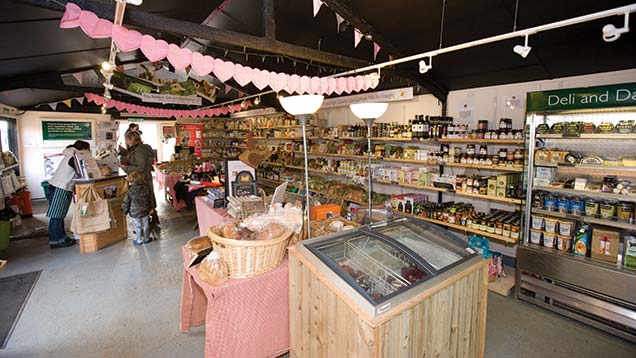8 top tips for farm shop businesses
 © Tim Scrivener
© Tim Scrivener Business owners and professionals from the food and retail sectors shared these eight nuggets of wisdom at the 2015 Farma Conference. Farma is a co-operative of farmers, small-scale local producers and farmers markets across the UK.
Make your farm a destination
Whether it is a place to spend a few hours with the kids, a venue for a quiet coffee with friends, or somewhere to pick up food for a week-night meal, you need to make your farm shop and/or café a destination. So consider whether your need a kids play area, or another service like click and collect, says Jock Rome, who owns Kilnford Barns Farm Shop in Dumfries and Galloway.
Explain your unique selling point
Tell customers what you’re about throughout their experience. You can do this through staff, or signage, or leaflets on tables in the café. If your focus is on local food, explain that. If all the meat is home-reared, promote that.
It’s easy to think that your USP is obvious and everybody knows what you’re doing, but actually this needs to be communicated, says Sally Jackson, Farma chair and owner of the Pink Pig Farm Shop in Lincolnshire. “We don’t communicate via osmosis,” she says.
Incentivise your staff
John Lewis staff are not called “employees”, they are “partners” and all are owners of the business. Head of the Norwich branch, Richard Marks, believes that this is one of the key factors that motivates the workforce and helps the company achieve trading success.
While not every farm shop or farm business can afford to make the company co-owned, perhaps there are other methods by which the staff can be given a bigger say or influence to make them feel like a contributor.
Consider who you want your customers to be
Adding an agritourism attraction to your farm shop can bring big benefits, but it can also come with complications. Sally Jackson found that adding a messy play barn to the site contributed considerably to businesses revenue. However, she stresses the importance of knowing the customer base you have and want before venturing into agritourism. For example, ladies who lunch and older customers might not want children running around their feet, so sometimes you have to make a choice. And it helps if you make those decisions early on so that you know where you’re heading.
React to changing tastes
“Farm shops need to be quick on their feet,” said Joe Parente, director of Welbeck Farm Shop in Nottinghamshire, who believes that the British public are more interested now than ever in high-quality food that they know the provenance of, but as trends change, it’s important to keep up with them and respond promptly. Joe suggests that shop staff ask customers: “What don’t we have that you would like to see?”
Talk to anyone and everyone
Business owners must have conversations with people they wouldn’t usually, in and outside of work in order to understand what they want and what trends are emerging, says food futurologist Morgaine Gaye. “Don’t just listen to people who think your business is the best thing ever,” she says.
Don’t forget PayPal
If you are going into e-commerce and selling your farm shop produce online, make sure you have PayPal integrated. Maurice Mcmenemy, manager of Kilnford Farm Shop, spoke about how click and collect now contributes a large proportion of their sales. People order food online and can pick it up on their way home. At first their site was not connected to PayPal, but since it was incorporated they have seen uplift in usage of the online service.
Negotiate, negotiate, negotiate
It is important to train the relevant people in any business, who are responsible for buying and/or selling, in negotiation because a lack of skill can have big financial consequences. So find training and workshops where you and your staff can learn how to do it well. On average, people spend six minutes negotiating when buying a house, says negotiation consultant Philip Blanc. He says that most negotiators leave the bargaining table thinking they were more successful in pushing the other person to their limit than they actually were.
